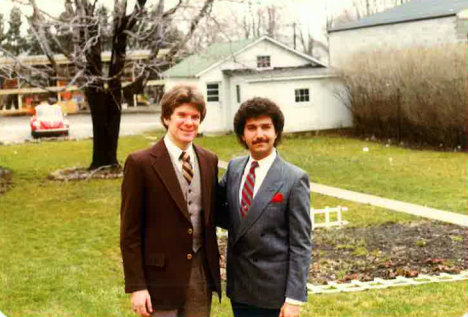In 1839, American columnist John O’Sullivan wrote, “We are the nation of human progress, and who will, what can, set limits to our onward march in this great experiment in liberty?”
When I was in college, I was privileged to find a friend from the other side of the planet. He had come from the strange and exotic city of Tehran, a world away from a small-town Pennsylvania boy like me. As our college experience unfolded we became like brothers and formed a friendship that would endure across four decades (and counting.) He taught me words in Aramaic and how to prepare and enjoy Persian food. I briefly fell in love with his glamorous Iranian friend and bungled the phrases he’d taught me when I tried to talk to her. (Sorry Carmen, I really did not think you were a cow.) Allen made every aspect of college funnier and infinitely more enjoyable. Most nights stayed up till the wee hours: laughing and joking and enjoying the exquisite pleasure of being twenty years old. The Shah was toppled while Allen was in college and he was trapped here, unable to go home, but safe in the United States. To my knowledge, he was not persecuted nor suspected of being a terrorist, despite the fact that we were nearly at war with Iran over the hostages the Ayatollah had seized. In those days we had a wise and godly leader in the White House, who did not decide to round up Iranians in internment camps, nor to deport them back home. (Where Allen would have immediately been called up for military service could likely have died in their long ruinous war with Iraq.) Today Allen is an American citizen, a successful designer in Los Angeles, and as true a friend as I’ve ever had. Because I knew you, Allen, I’ve been changed for good.

Nearly 40 years later I have another precious Iranian in my life: Mohammad, a young earnest student in my U.S. Government class. He is the first Iranian to study at the Academy since the Shah fell all those decades ago. Thanks to the modest progress made under Pres. Obama in the deeply troubled U.S/Iran relationship, this young Muslim was able to realize his dream of studying at an American high school. He will graduate in May and has been happily applying to American colleges; I served as one of his references for his common application. His father was proudly making plans to fly here to celebrate his son’s accomplishments this June. In Government class, Mohammad contributed to lively discussions about the American political system (which he respected, at least until November 9) and the contrast with the theocracy in Iran. But as of this past weekend, all of those plans have been smashed. His father will not be able to attend his graduation and Mohammad will not be able to get a student visa to attend an American university.
As O’Sullivan described, the American system was built on our boundless hope in progress. So why are we now regressing? How could we have learned so little in the last three decades? (Why aren’t we acting like Justin Trudeau?) Instead, “His Illegitimacy” has determined that Iranian students and visitors from Muslim countries are a threat to our democracy and must be banned. If he really wants to discover the threat to our democracy, he should consult the nearest White House mirror.
Mohammad, I am sorry that your American dream did not end as happily as Allen’s and I’m so deeply sorry that in the two generations between you and Allen, our nation did not become ever more progressive, but rather more xenophobic, more paranoid, and less welcoming of Middle Eastern visitors and friends. I vividly remember watching a remarkable scene unfold on television following the September 11th attacks. When the news reached Tehran, they stopped a national soccer match for a long moment of silence as the players knelt and fans bowed their heads in sorrow over what had happened to the American people. That night young people crowded into the city square for a candlelight vigil that showed how humanity could transcend our imaginary political barriers. I thought to myself, “perhaps some good will come out of this yet.” Maybe in the post-Trump years to come we will find ways to embrace our commonalities rather than despise our differences. I would like to believe that future generations of Americans will welcome the Allens and Mohammads of the world.

So beautifully written Tim!!
LikeLike
Thank you, Laine.
LikeLike